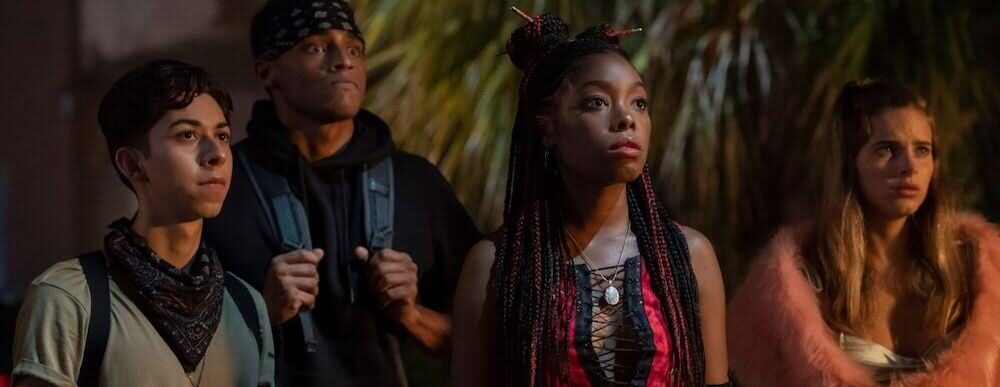
18 Jan Black As Night: One Girl’s Fight Against Vampires, Capitalism, and White Supremacy
BY JOHN MORRISON
In director Maritte Lee Go’s coming of age vampire flick, Black As Night, one young girl must overcome her own self doubt and fear in order to save her hometown from a new threat whose roots run deep into the city’s old and bloody history. A riveting and charming film, Black As Night uses some well-worn tropes and archetypes to tell a deeper story that speaks to the horrors of slavery, racism, colorism and class stratification that corrode American society from its roots. Set in a present day New Orleans that has been marked by the trauma of Hurricane Katrina, the film introduces us to our protagonist, Shawna (Ashja Cooper) hanging out on a hotel rooftop with her best friend Pedro (Fabrizio Guido). As Shawna and Pedro shoot the shit, Shawna’s voiceover sets the scene: “We didn’t know it but this summer was about to be very very different. The summer I got breasts, that was the same summer I fought vampires.” Shawna lives with her father and is struggling to heal the relationship with her mother who lives at The Ombreaux, a run-down, drug-addled housing complex, having spiraled into drug addiction as a direct result of post-Katrina trauma.
Later that night, Shawna and Pedro attend a party. After embarrassing herself in a futile attempt to make small talk with Chris–a classmate and the object of her affection–Shawna walks home. On this walk, she has her first encounter with the vampires that have been covertly ravaging the streets of New Orleans. Shawna is attacked. In this first fight, Shawna is bitten but does not turn into a vampire. In the Black As Night universe, a mere bite from a vampire is not enough to turn a human; the victim’s blood must be drained and replaced with a vampire’s blood in order for the victim to be turned. The process requires a complete extraction and replacement. Armed with the knowledge that vampires are in fact real and terrorizing the city’s addicts and homeless population, Shawna and Pedro head to Shawna’s mom’s apartment at The Ombreaux in an attempt to warn her and get her out. When they arrive, they find her laying unresponsive in her dark and dirty living room. Initially, she appears to be in a drug-induced stupor, but it is then revealed that Shawna’s mom has been turned. A struggle ensues and her mom is accidentally exposed to sunlight, killing her. From here, Shawna vows to avenge her mother’s death by hunting and killing the vampires.

In the book Buffy The Vampire Slayer: Myth, Metaphor And Morality, the writer Mark Field explores the philosophical themes that underpin the classic 90s television series. Field explains that while the metaphysical nature of Buffy Summers’ strength and agility elevates her to the realm of the supernatural, the very real challenges of self-actualization, and her walk into young adulthood, speak to themes that are unique to the plight of young women specifically but are also universal. Field succinctly points this out by identifying the central metaphor of the show as “Buffy is us and we are her.” Much like Buffy, Shawna’s heroic arc plays out both interpersonally and in the world around her. One element of Shawna’s struggle that Black As Night is bent on tackling (with varying degrees of success) is the issue of colorism. In the first scene with Shawna, Pedro–who is Latinx with a lighter complexion–relaxes and sunbathes on the hotel roof while Shawna covers her skin with a hoodie, fearful that the sun will make her darker. Later, we see her brother tease her for being dark skinned and at one point she flirts with the idea of purchasing skin lightening cream. These allusions to the skin color hierarchy and the poison that it produces are peppered throughout the film, reflecting how it permeates our society. In one scene a vampire named Lefrak tells Shawna that he prefers lighter skinned girls, proving that colorism is a thing to be contended with even in the afterlife.
With her team of Pedro and Chris, as well as vampire lore/pop culture expert Granya (Abbie Gayle) and vampire-turned-vampire hunter Tunde (Sammy Nagi Njuguna), Shawna wages war against the vamps and we get some key exposition on the roots of New Orleans’ vampire threat. As Tunde explains, the leader of the vampire coven that is terrorizing The Ombreuax is an old vampire named Babineaux (Keith David). Babineaux’s story reveals Black As Night’s second major theme: the ills that we face in the present day have their roots in the unaddressed sins of history. As “an ex-slave who’d seen the worst in humanity,” Babineaux was attacked by a vampire while out in the fields and turned. He then used his newfound power to kill his master. As the decades wore on, Hurricane Katrina struck New Orleans and Babineaux decided to take action building an army amongst the poor and oppressed as “the gap between the haves and the have-nots continues to grow.” This bit of exposition frames the current wave of vampires in New Orleans as a direct outgrowth of slavery and thus an extension of capitalism and racism-white supremacy. While Black As Night doesn’t attempt to uncover the origins of vampirism like Buffy did, it does present it as a phenomenon (like Katrina?) that is exacerbated by capitalism and racism. The film reinforces this point via the vampire’s choice of victims and it is no surprise that the vampires prefer to target the most vulnerable populations (including the homeless man gathering cans and Shawna’s mother).

After an epic final showdown, Babineaux is defeated and Shawna and crew emerge victorious. Black As Night is fun and has a lot of heart, drama, and intrigue. The film also has about two armfuls worth of ideas that it doesn’t get to fully flesh out in its hour and twenty-seven minute run time. There are allusions to a gentrification subplot, the potential for some interesting commentary on activism and authenticity, and Granya and her crew of would-be goth vampire fetishists, but those would be better served if Black As Night were a series. Despite its limitations (like Pedro’s painfully unceremonious death and turning), Black As Night is an enjoyable spin on the vampire hunter/slayer subgenre. Ashja Cooper and Fabrizio Guido anchor the film with strong and endearing performances. Much of the film’s power and focus come in the way that it successfully ushers us through Shawna’s triumph over her own internal and interpersonal struggles, a triumph that prepares her to win the larger battle to save her city.
Where to watch: Amazon

John Morrison is a writer, DJ, and radio host from Philadelphia. His work has appeared in NPR Music, Red Bull Music Academy, Bandcamp Daily, and more.

Sorry, the comment form is closed at this time.